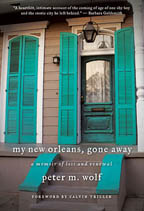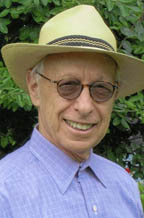Peter M. Wolf
Biography
Peter M. Wolf is a sixth-generation member of a New Orleans family long integral to that city’s culture and commerce. Wolf is a nationally recognized land planning, urban policy and asset management authority; founder of the Thomas Moran Trust; chairman of the Godchaux-Reserve Plantation Fund; and a trustee in East Hampton of Guild Hall and the Village Preservation Society. His research and writing has been supported by the National Endowment for the Arts, the Ford Foundation, the American Federation of Arts and a Fulbright Fellowship.
Schedule
Will post information when available

My New Orleans, Gone Away: A Memoir of Loss and Renewal
In this poignant and vivid memoir, Peter M. Wolf, a member of one of New Orleans’s oldest Jewish families, provides an insider’s look at his fabled city and the wider world beyond that he comes to inhabit.
Written with humor and telling detail, My New Orleans contains rare insight about the social structure of New Orleans; student life at Exeter, Tulane and Yale; the thrill of original scholarship; around-the-world travel before jets; medical school trauma; ingrained Southern racism and anti-Semitism; and American students’ role in anti-Vietnam uprisings in Paris. In the background, he traces the rags to riches rise and fall of his city’s and his family’s engagement in the cotton, sugar and retail trades.
At Yale, Wolf’s closest friends included Calvin Trillin, the author and celebrated humorist-to-be; Henry Geldzahler, the future world famous art historian; and Gerald Jonas, the poet and writer. These three, whose stories are woven into the narrative, conspire to unveil Wolf's curious 1950s variety of assimilated southern Judaism. Trillin also contributed the book’s foreword.
After a year of medical school at Columbia and continuing his journey of self-discovery, Wolf returns to New Orleans to work in his father’s cotton brokerage and simultaneously earns a master’s degree at Tulane. In spite of a spicy love affair, his residence in a glorious French Quarter courtyard, his purchase of a dilapidated building he expects to restore and growing prominence in his community, Wolf returns to the East. He completes doctoral studies at NYU and becomes an architectural historian, a profession in which he earns considerable prominence.
The author’s complicated and achingly explored romantic life is slammed to a close by a saucy, waspy, expat from Texas he meets during his year as a Fulbright scholar in Paris, and subsequently marries.
Reflecting the yearnings and anxieties of a generation that came of age after World War II, this is the iconic journey of a restless man who leaves the hometown he loves to discover the world, and in so doing, finds himself. My New Orleans offers a penetrating and memorable account of a fading period of America’s evolution, turbulence and possibilities as unique as the city of Wolf’s memory.

Q&A
What is the most important thing readers can learn from your book My New Orleans, Gone Away?
The possibility to elevate with forgiveness the pain of the past that resides in families, arrive at a larger truth. A way to recall the American 1950s and 1960s, in retrospect, a time of amazing innocence in the nation and in many of us. Some have called My New Orleans, Gone Away the memoir of an American generation.
What motivated you to tell this story?
I did not set out to write a memoir. I would never have dreamed of doing such a thing. I started out just for myself and maybe my immediate family to set down recollections, happy and troubling. Years into that, a very experienced editor read some of my material and said I had to write this book. So then I decided that in my own way I would try to preserve what I could, and understand what I had not, by writing this memoir.
What was the most enjoyable or interesting part of the process of writing this book?
The experience of spontaneous memory. All along the way, sitting along with certain scenes in vivid recall, so much more came into view. Not just places, but notions, and even access to circumspection I’d been previously too lazy to engage. It was a ten year process.
How do you think this story resonates with Louisiana (culture, readers, history, Louisianans, etc.)?
It is wrapped and sealed in Louisiana culture, history, over a period of six generations of one family based in New Orleans all the way from penniless immigration in the 1840s to the present. It chronicles the rise and then decline of one of the most celebrated Jewish families in the state. It presents their sugar, cotton and retail legacies over many eras. It also addresses the rarely presented role of the Jewish community in New Orleans, its prominent citizens and the facts of anti-Semitism that dominate the power structure of social New Orleans.
What excites you about the festival?
The opportunity to meet other authors with related interests, and the chance to speak to people of all sorts who may be interested in the work that I’ve done.
What should people look forward to by coming to your presentation at the festival?
An insider’s look at less often discussed social customs that define New Orleans in the past, and to this day. Some very fun accounts of emerging awareness of a Jewish identity helped along by close college friends such as the humorist and noted author Calvin Trillin, writer and poet Gerry Jonas, and the famous historian known as the ‘Pope of Pop’ Henry Geldzahler. Also an appreciation of the architecture of New Orleans expanded into historic preservation education and initiatives elsewhere.
Volunteer
Book-loving volunteers are essential to the Louisiana Book Festival's success. Whether it's escorting authors, guiding visitors, selling refreshments, working with children in the Young Readers Pavilion or other fun and rewarding assignments, the Louisiana Book Festival wants you to join the volunteer team.



